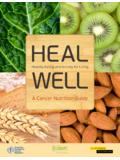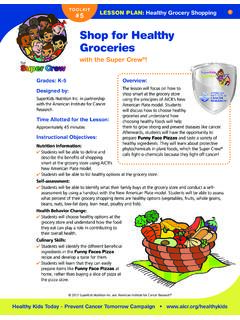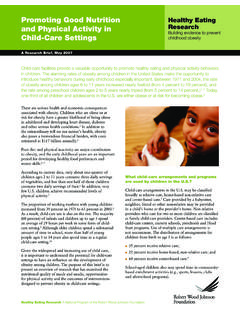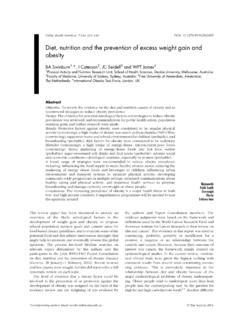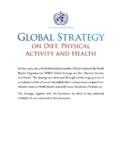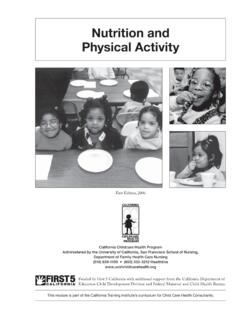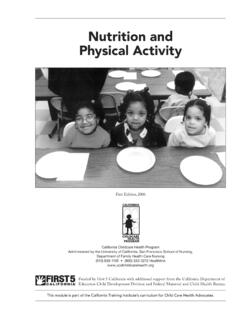Transcription of Diet, nutrition, physical activity and lung cancer - aicr.org
1 Analysing research on cancer prevention and survival2017 diet , nutrition , physical activity and lung cancerRevised 2018 ContentsWorld cancer Research Fund Network 31. Summary of Panel judgements 92. Trends, incidence and survival 103. Pathogenesis 124. Other established causes 13 5. Interpretation of the evidence General Specific 146.
2 Methodology Mechanistic evidence 167. Evidence and judgements Arsenic in drinking water Beta-carotene supplements Vegetables Fruit Foods containing carotenoids Foods containing beta-carotene Foods containing vitamin C Foods containing isoflavones Red meat Processed meat
3 Foods containing retinol Alcoholic drinks physical activity Other 50 8. Comparison with the Second Expert Report 509. Conclusions 51 Acknowledgements 52 Abbreviations 54 Glossary 55 References 61 Appendix.
4 Criteria for grading evidence for cancer prevention 67 Our cancer Prevention Recommendations 71 LUNG cancer REPORT 20173 WORLD cancer RESEARCH FUND NETWORK OUR VISIONWe want to live in a world where no one develops a preventable MISSIONWe champion the latest and most authoritative scientific research from around the world on cancer prevention and survival through diet , weight and physical activity , so that we can help people make informed choices to reduce their cancer risk. As a network, we influence policy at the highest level and are trusted advisors to governments and to other official bodies from around the NETWORK World cancer Research Fund International is a not-for-profit organisation that leads and unifies a network of cancer charities with a global reach, dedicated to the prevention of cancer through diet , weight and physical World cancer Research Fund network of charities is based in Europe, the Americas and Asia, giving us a global voice to inform people about cancer cancer REPORT 20174 OUR CONTINUOUS UPDATE PROJECT (CUP) The Continuous Update Project (CUP) is the World cancer Research Fund (WCRF)
5 Network s ongoing programme to analyse cancer prevention and survival research related to diet , nutrition and physical activity from all over the world. Among experts worldwide it is a trusted, authoritative scientific resource which informs current guidelines and policy on cancer prevention and survival. Scientific research from around the world is continually added to the CUP s unique database, which is held and systematically reviewed by a team at Imperial College London. An independent panel of experts carries out ongoing evaluations of this evidence, and their findings form the basis of the WCRF Network s cancer Prevention Recommendations (see inside back cover).Through this process, the CUP ensures that everyone, including policymakers, health professionals and members of the public, has access to the most up-to-date information on how to reduce the risk of developing launch of the WCRF Network s Third Expert Report, diet , nutrition , physical activity and cancer : a Global Perspective, in 2018 brings together the very latest research from the CUP s review of the accumulated evidence on cancer prevention and survival related to diet , nutrition and physical activity .
6 diet , nutrition , physical activity and lung cancer is one of many parts that make up the CUP Third Expert Report: for a full list of contents, see CUP is led and managed by World cancer Research Fund International in partnership with the American Institute for cancer Research, on behalf of World cancer Research Fund UK, Wereld Kanker Onderzoek Fonds and World cancer Research Fund TO CITE THIS REPORTThis part: World cancer Research Fund/American Institute for cancer Research. Continuous Update Project Expert Report 2018. diet , nutrition , physical activity and lung cancer . Available at whole report: World cancer Research Fund/American Institute for cancer Research. diet , nutrition , physical activity and cancer : a Global Perspective. Continuous Update Project Expert Report 2018.
7 Available at to other parts of the Third Expert Report are highlighted in purple. LUNG cancer REPORT 20175 EXECUTIVE SUMMARYB ackground and contextLung cancer is the third most common cancer worldwide. About million new cases of lung cancer were recorded globally in 2012, accounting for 13 per cent of all new cases of cancer [2].Lung cancer is the most common cause of death from cancer , estimated to be responsible for nearly one in five cancer deaths. Lung cancer survival is mostly determined by the stage at which it is diagnosed, with later-stage diagnosis having poorer survival. In the United States, the five-year survival rate is 17 per cent for lung cancer overall. However, this rises to 55 per cent for lung cancers diagnosed at an early stage. About 58 per cent of cases of lung cancer worldwide occur in developing countries.
8 In men lung cancer is the most common cancer diagnosed, and the highest lung cancer rates are in Central and Eastern Europe and Eastern Asia. In women lung cancer is the third most common cancer , and the highest rates are in North America, Northern Europe and Eastern Asia [2]. Rates of lung cancer incidence in many developed countries are declining because fewer people are smoking. Conversely, in some countries, including China, South Korea and several countries in Africa, smoking rates are peaking or continuing to increase and the number of new lung cancer cases continues to rise. In this report from our Continuous Update Project (CUP) the world s largest source of scientific research on cancer prevention and survivorship through diet , weight and physical activity we analyse global research on how certain lifestyle factors affect the risk of developing lung cancer .
9 This research includes new studies as well as those included in our 2007 Second Expert Report, Food, nutrition , physical activity , and the Prevention of cancer : a Global Perspective [1].LUNG cancer REPORT 20176In addition to the findings in this report, other established causes of lung cancer include the following:1. Smoking n Smoking is the main cause of lung cancer . It is estimated that over 90 per cent of cases among men and over 80 per cent among women worldwide are attributable to tobacco use. Passive smoking is also a cause of lung Previous lung diseasen A history of emphysema, chronic bronchitis, tuberculosis or pneumonia is associated with an increased risk of lung cancer . People with antibodies to Chlamydia pneumoniae, a type of bacterium that can cause chest infections, have an increased risk of lung Other exposures n Occupational exposure to asbestos, crystalline silica, radon, mixtures of polycyclic aromatic hydrocarbons and heavy metals are associated with an increased risk of lung cancer as well as indoor air pollution from wood and coal burning for cooking and heating.
10 How the research was conductedThe global scientific research on diet , weight, physical activity and the risk of lung cancer was systematically gathered and analysed, and then independently assessed by a panel of leading international scientists in order to draw conclusions about which of these factors increase or decrease the risk of developing lung cancer . More research has accumulated on this topic since our 2007 Second Expert Report [1]. In total, this new report analyses 124 studies from around the world, covering nearly 14 million adults and over 122,000 cases of lung cancer . To ensure consistency, the methodology for the Continuous Update Project remains largely unchanged from that used for our 2007 Second Expert Report [1].A summary of the mechanisms underpinning all the findings can be found in the Evidence and Judgements section of this cancer REPORT 20177 FindingsThere is strong evidence that:n There is strong evidence that drinking water containing arsenic increases the risk of lung cancer .
